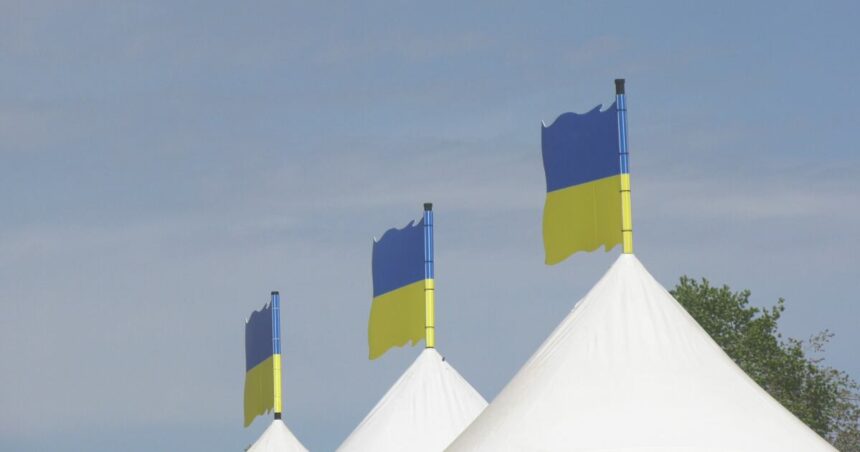I stepped into Borden Park this weekend with the infectious sounds of Ukrainian folk music filling the air. UFest returned to Edmonton for its ninth year, transforming the eastside green space into a vibrant celebration of Ukrainian culture that felt both timeless and urgently relevant.
“This festival has never been more important,” shared Maria Kowalchuk, UFest’s volunteer coordinator, as we chatted near the main stage. “With everything happening in Ukraine, our community needs this connection to our heritage more than ever.”
The festival grounds buzzed with energy as thousands of attendees—many wearing embroidered vyshyvankas and blue and yellow accessories—moved between food vendors, craft displays, and performance areas. Children with flower crowns dashed between groups of elders who nodded appreciatively to familiar melodies.
For newcomer Olena Petryk, who arrived in Edmonton just eight months ago from Kyiv, the festival offered a surprising comfort. “I didn’t expect to find such authentic Ukrainian culture here in Canada,” she told me, her eyes brightening as she described the varenyky that “taste just like my grandmother’s.”
The culinary offerings indeed proved to be a highlight. Lines stretched twenty people deep for traditional favorites at food stalls operated by local Ukrainian restaurants and community organizations. The aroma of sizzling kovbasa sausage mingled with the sweet scent of honey cake, creating an irresistible sensory experience.
“We’ve been preparing for weeks,” explained Bohdan Shevchenko of Taste of Ukraine restaurant, who estimated they would serve over 3,000 cabbage rolls during the two-day event. “Food connects people to their roots. When someone tastes our borscht, they’re experiencing generations of tradition.”
Beyond the delicious offerings, this year’s festival placed special emphasis on educational components. The Heritage Pavilion featured displays chronicling Ukrainian immigration to Alberta, which dates back to the 1890s when the first Ukrainian settlers arrived in the province.
Local historian Natalia Krawchuk guided visitors through the exhibit. “Many Edmontonians don’t realize that Ukrainian culture is literally woven into the fabric of this city,” she explained. “From place names to architecture to political contributions—our influence is everywhere.”
The Edmonton region indeed has deep Ukrainian roots, with Statistics Canada reporting over 145,000 residents of Ukrainian descent in the metropolitan area. That connection was visible throughout UFest, where multiple generations participated together in workshops teaching traditional crafts like pysanka Easter egg decoration and vinok flower crown making.
On the main stage, the Viter Ukrainian Folk Choir delivered a powerful performance that blended traditional songs with contemporary arrangements. Their rendition of “Chervona Ruta,” a beloved Ukrainian folk song, prompted spontaneous singing from the audience.
“Music preserves our language and our stories,” choir director Lesia Pohoreski told me after their set. “When our youth learn these songs, they’re carrying forward something precious.”
Perhaps most moving was the “United for Ukraine” display near the festival entrance, where visitors added personal messages to a massive solidarity banner. The area also served as a fundraising hub for humanitarian aid, with volunteers collecting donations for medical supplies and refugee support programs.
City Councillor Anne Stevenson, who attended the opening ceremonies, emphasized the event’s importance beyond just cultural celebration. “Edmonton stands with Ukraine, and events like UFest help keep attention on the ongoing crisis while celebrating the incredible contributions Ukrainian-Canadians have made to our city.”
As evening approached, the celebration continued with dance ensembles performing hopaks and other traditional dances that brought spectators to their feet. The intricate footwork and colorful costumes created a mesmerizing display of athletic artistry that connected past and present.
“My grandparents would be so proud to see this,” remarked long-time attendee Stefan Boyko, watching his granddaughter perform with the Trembita Dance Ensemble. “They came here with nothing but their traditions, and look at how we’ve kept them alive.”
UFest continues Sunday at Borden Park from 11 a.m. to 7 p.m., with highlights including more culinary offerings, craft vendors, and the much-anticipated Hopak dance competition. Festival organizers expect attendance to exceed last year’s record of 12,000 visitors.
For those who’ve never experienced Ukrainian culture, UFest offers an accessible entry point. As Maria Kowalchuk put it so perfectly: “You don’t have to be Ukrainian to appreciate good food, beautiful music, and a community that knows how to celebrate life even in difficult times.”
I left the festival grounds as the setting sun cast a golden glow across Borden Park, my notebook full and my stomach satisfied with varenyky. The sounds of the bandura, a traditional Ukrainian string instrument, followed me to the parking lot—a fitting reminder that cultural traditions remain vibrant when communities come together to preserve and share them.







